KARACHI: While earthquakes have low predictability, there is an urgent need that the government, media and civil society promote enforcement of construction laws in Karachi and help spread awareness of safety techniques besides making comprehensive plans for large-scale emergencies, said experts at a seminar on Saturday evening.
At the seminar titled ‘Is Karachi prepared to face the ravages of an impending earthquake?’, deputy director of the Institute of Meteorology and Geophysics M. Sohail Gadiwala thoroughly explained the technical details of how an earthquake occurs, the various forms of tectonic plate activity, and related knowledge in a presentation.
Assistant director at the Provincial Disaster Management Authority (PDMA) Ajay Kumar Sewani gave an account of the intricate arrangements and other mechanisms of the disaster management institutions in Karachi and other parts of the province.
Some of the initiatives that the PDMA had already taken included the establishment of Provincial Emergency Operation Centres and Gender Child Cells, added Mr Sewani.
In his keynote address, Arif Dossal informed the gathering that earthquakes had low predictability and said both the citizens and the authorities concerned must prepare themselves before a natural disaster. For the former, he highlighted the urgent need to inculcate within ourselves a sense of responsible construction. In this regard, he referred to building quake-resistant structures. He also urged the youth to train themselves in first aid and fire-fighting techniques in order to deal with emergencies efficiently. He also called for reduction of potential safety hazards within our homes, and keeping fire extinguishers and medical kits.
He urged the authorities concerned to restore the civil defence institutions and training, implement laws on building, enlist the media to help spread awareness of safety techniques, and most importantly, combine all the above in the making of large-scale plans for emergencies.
Karachi Commissioner Shoaib Ahmed Siddiqui highlighted the need to have a well-coordinated logistics system for disaster management that he said was at its weakest at present in the city. He also gave a detailed account of the actions that had already taken by the authorities regarding disaster management in the city.
Some of these actions included awareness groups, help lines, and increased collaboration between all municipalities and cantonment boards of Karachi, he claimed. He said improved cooperation between the numerous local authorities of Karachi had resulted in the discovery of indispensable resources.
Other speakers included Athar Jamal, head of emergency medical services at the Aman Foundation, and journalist Owais Tohid. A number of students besides the faculty members attended the seminar which was held at the Commecs Institute of Business and Emerging Sciences.













































Dear visitor, the comments section is undergoing an overhaul and will return soon.